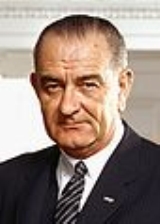
(1963–1969) after his service as the 37th Vice President of the United States
(1961–1963). He is one of only four people who served in all four elected federal offices of the United States: Representative, Senator, Vice President and President.
Johnson, a Democrat, served as a United States Representative from Texas
, from 1937–1949 and as United States Senator from 1949–1961, including six years as United States Senate Majority Leader
, two as Senate Minority Leader and two as Senate Majority Whip
.
1963 In Dallas, Texas, US President John F. Kennedy is killed and Texas Governor John B. Connally is seriously wounded by Lee Harvey Oswald, who is later captured and charged with the murder of police officer J. D. Tippit. That same day, US Vice-President Lyndon B. Johnson is sworn in as the 36th President of the United States.
1963 Vietnam War: Newly sworn-in US President Lyndon B. Johnson confirms that the United States intends to continue supporting South Vietnam both militarily and economically.
1963 U.S. President Lyndon B. Johnson establishes the Warren Commission to investigate the assassination of President John F. Kennedy.
1964 President Lyndon B. Johnson declares a "War on Poverty" in the United States.
1964 U.S. President Lyndon B. Johnson announces the goals of his Great Society social reforms to bring an "end to poverty and racial injustice" in America.
1964 U.S. President Lyndon B. Johnson signs the Civil Rights Act of 1964 meant to prohibit segregation in public places.
1964 Vietnam War: the U.S. Congress passes the Gulf of Tonkin Resolution giving US President Lyndon B. Johnson broad war powers to deal with North Vietnamese attacks on American forces.
1964 Vietnam War: National Security Council members agree to recommend that U.S. President Lyndon B. Johnson adopt a plan for a two-stage escalation of bombing in North Vietnam.
1964 Vietnam War: U.S. President Lyndon B. Johnson and his top-ranking advisers meet to discuss plans to bomb North Vietnam.
1965 United States President Lyndon B. Johnson proclaims his "Great Society" during his State of the Union address.
And I just want to tell you this — we're in favor of a lot of things and we're against mighty few.![]()
I do not find it easy to send the flower of our youth, our finest young men, into battle.![]()
It's probably better to have him inside the tent pissing out, than outside the tent pissing in.![]()
Making a speech on economics is a lot like pissing down your leg. It seems hot to you, but it never does to anyone else.![]()

